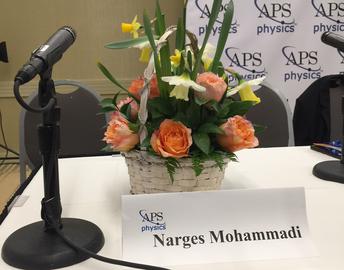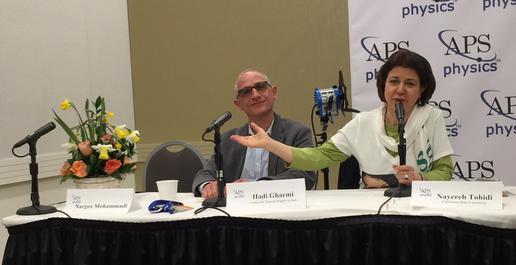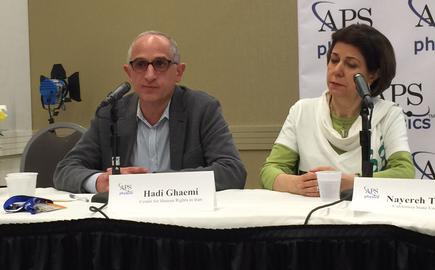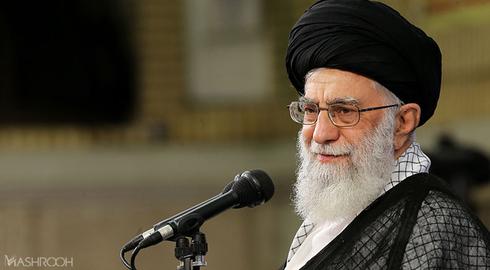Human rights activist, physicist and engineer Nargess Mohammadi has been awarded the 2018 Andrei Sakharov Prize.
Mohammadi, the vice president of Iran’s Defenders of Human Rights Center, is serving a 16-year prison sentence for “collusion against national security” and “propaganda against the state,” and so is unable to receive the prize in person, which will be presented by the American Physical Society (APS) in Columbus, Ohio on April 16. But, in a message read out by Professor Nayereh Tohidi of California State University, she called on activists to continue their work to advance civil society in Iran and insisted she would not be silent. “The path to democracy in Iran lies not through violence, war, or military action by a foreign government,” she said, adding that the Iranian government was afraid of human rights institutions, campaigns and activism.
By keeping her behind bars, Islamic Republic authorities have attempted to silence her, but her status as a political prisoner has drawn further attention to the causes she champions: She is a fierce opponent of the death penatly, an advocate of women’s rights, and a campaigner for the rights of intellectuals, academics and writers.
Mohammadi holds a physics degree from Imam Khomeini University in Qazvin. In 2009, she was dismissed from her job as an engineer with the Iran Engineering Inspection Corporation. Since 2009, she has been arrested several times, and most recently in May 2015. She has remained in prison since then.
In May 2016, Judge Abolghasem Salavati sentenced Mohammadi to 16 years in prison. In June, she went on a 19-day hunger strike in protest against authorities’ refusal to allow her to speak with her children, Ali and Kiana, who live in Paris with their father, Mohammadi’s husband Taghi Rahmani. In September the same year, Tehran’s Revolutionary Court of Appeals upheld the verdict.
During her incarceration in Tehran’s Evin Prison, Mohammadi has often been held in solitary confinement, which has had a detrimental impact on her health. She suffers from a debilitating neurological condition, and she has also developed blood clots in her lungs.
The UN High Commissioner for Human Rights Zeid Ra’ad Al Hussein has condemned the verdict against Mohammadi.
Mohammadi, 45, shares the prestigious prize with Indian human rights and social justice campaigner Ravi Kuchimanchi.
Traditionally, winners are awarded $10,000 and their travel expenses are covered so they can attend the event in person.
Previous recipients of the Andrei Sakharov include Saudi blogger Raif Badawi, Pakistani human rights activist Malala Yousafzai and Nelson Mandela.
“Sitting here in the prison, I am humbled by the honor you have bestowed on me and I will continue my efforts until we achieve peace, tolerance for a plurality of views, and human rights,” Mohammadi said.
The full text of Narges Mohammadi’s acceptance speech follows:
In the last 25 years, I have been active in 11 civil society organizations, either as a member or as a founding member. Now, with great regret, I see the doors of these organizations being closed and sealed by the government. Yet I am not hopeless nor have I lost my motivation. We cannot stop trying. I still hope and deeply believe that the tireless efforts of our civil society activists will eventually bear fruit. I am awaiting the moment I can rejoin my colleagues in these activities once I am released. The path to democracy in Iran lies not through violence, war, or military action by a foreign government, but through organizing and strengthening civil society institutions. The government knows this only too well. It is fearful of non-governmental civil society organizations precisely because of its undemocratic nature. It cannot even tolerate unions such as Association of Iranian Journalists, or human rights organizations such as the Center for Defenders of Human Rights, or charity bodies like the Association in Support of Working Children.
As a human rights defender, like millions of Iranians, I hate the death penalty; I despise discrimination and injustice against women; I protest against the imprisonment and torture of political and civil rights activists in solitary confinement; and I will not be silent in the face of human rights violations. In order to institutionalize human rights and achieve peace between the people and the state, I shall endure my deprivation of freedom and rights, even though separation from my children is nothing less than death for me. I am a woman and a mother, and with all my feminine and maternal sensibilities, I seek a world free from violence and injustice, even if I have suffered injustice and violence tens of times.
Thoughts and dreams don’t die. Belief in freedom and justice does not perish with imprisonment, torture or even death and tyranny do not prevail over freedom, even when they rely on the power of the state. Sitting here in the prison, I am deeply humbled by the honor you have bestowed on me and I will continue my efforts until we achieve peace, tolerance for a plurality of views, and human rights.
visit the accountability section
In this section of Iran Wire, you can contact the officials and launch your campaign for various problems



























comments